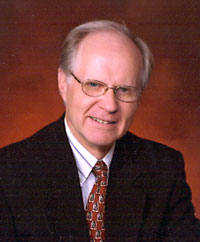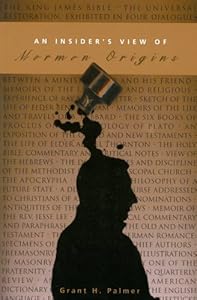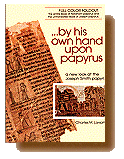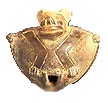Links: Facsimile 1 | Facsimile 2 | Facsimile B | Jos. Smith Papyri | Hypocephalus | Sheshonq | Liahona | HOME
HOME ~ @Com ~
On the 'Net since 1994
Three Meetings with an LDS General Authority
2012/2013
by Grant H. Palmer ~ April 6, 2013In mid-October 2012, a returned LDS Mission President contacted me to arrange a meeting. Several days later, he called again and said that a member of the First Quorum of the Seventy also wished to attend. He said the General Authority would attend on condition that I not name him or repeat any stories that would identify him. He explained that neither of them, including the GA’s wife, believed the founding claims of the restoration were true. He clarified that they had read my book, An Insider’s View of Mormon Origins, and had concluded that the LDS Church was not true; was not what it claimed to be. The GA often went to the MormonThink.com website for information and there discovered my book. The Mission President said he received my book from the GA.
We have at this writing met three times. We first met on Tuesday, October 23, 2012 and again February 14, 2013 at my house. On March 26, 2013 we convened at the GAs house. Upon entering my home for the first meeting the GA said, “We are here to learn.” I recognized him. He has been a member of the First Quorum of the Seventy for a number of years. He has served in several high profile assignments during this period. The following are the more important statements made by the GA during our first three meetings. We now meet monthly.
Grant H. PalmerHe said that each new member of the Quorum of the Twelve Apostles is given one million dollars to take care of any financial obligations they have. This money gift allows them to fully focus on the ministry. He said that the overriding consideration of who is chosen is whether they are “church broke,” meaning, will they do whatever they are told. He said the senior six apostles make the agenda and do most of the talking. The junior six are told to observe, listen and learn and really only comment if they are asked. He said that it takes about two to three years before the new apostle discovers that the church is not true. He said it took Dieter F. Uchtdorf a little longer because he was an outsider. He said they privately talk among themselves and know the foundational claims of the restoration are not true, but continue on boldly “because the people need it,” meaning the people need the church. When the Mission President voiced skepticism and named ___ as one who surely did believe, The GA said: “No, he doesn’t.” The one million dollar gift, plus their totally obedient attitude makes it easy for them to go along when they find out the church is not true. For these reasons and others, he doesn’t expect any apostle to ever expose the truth about the foundational claims.
When I asked the GA how he knew these things, he answered by saying that the Quorum of the Twelve today is more isolated from the Quorums of the Seventies now because there are several of them. When only one Quorum of the Seventy existed, there was more intimacy. During his one on one assignments with an apostle, conversations were more familiar. He said that none of the apostles ever said to him directly that they did not believe; but that it was his opinion based on “my interactions with them.” Also, that none of the Twelve want to discuss “truth issues,” meaning issues regarding the foundational claims of the church. He said that the apostle’s lives are so completely and entirely enmeshed in every detail of their lives in the church, that many of them would probably die defending the church rather than admit the truth about Joseph Smith and the foundations of the church.
The GA stated that my disciplinary action (which would have occurred on the final Sunday of October 2010 had I not resigned), was mandated/ordered/approved by the First Presidency of the Church. I said that if the apostles know the church is not true and yet order a disciplinary hearing for my writing a book that is almost certainly true regarding the foundational claims of the church, then they are corrupt even evil. He replied, “That’s right!”
The GA said the church is like a weakened dam. At first you don’t see cracks on the face; nevertheless, things are happening behind the scenes. Eventually, small cracks appear, and then the dam will “explode.” When it does, he said, the members are going to be “shocked” and will need scholars/historians like me to educate them regarding the Mormon past.
The Mission President and the GA both said they attend church every Sunday and feel like “a hypocrite and trapped.” The GA said his ward treats him like a king and when he gives firesides and speaks to LDS congregations they have high expectations of him. He would like to do more in getting the truth out besides raising a few questions when speaking and gifting my book to others when feeling comfortable. Perhaps this is why he has reached out to me. The GA is a man of integrity and very loving. Upon leaving each time, he always gives me a big hug.
Books...
amazon.com
By His Own Hand
Upon Papyrus:
A New Look at the
Joseph Smith PapyriDo the Following Statements Support the Disclosures of the GA?
Apostle Boyd K. Packer said to Michael Quinn when interviewing him for a history position at BYU in 1976, “I have a hard time with historians because they idolize the truth. The truth is not uplifting, it destroys,” quoted in, Faithful History: Essays on Writing Mormon History, editor, George D. Smith, (Salt Lake City, Utah: Signature Books, 1992), 76n22.Gregory Prince, who wrote a seminal biography of President David O. McKay, related to me that when he interviewed Hugh Nibley, a professor at BYU in 1995, that “At one point in the interview he [Nibley] asked that I turn off the tape recorder, which I did. He then related a curious anecdote relating to McKay and the Book of Mormon,” indicating that McKay did not believe in the historicity of the Book of Mormon (emails exchanged between me and Greg Prince on June 22, 2005. These documents are located in The Grant H. Palmer Papers, Accn 2071, Manuscripts Division, Marriott Library, University of Utah, Salt Lake City, Utah).
Thomas Stuart Ferguson, a California lawyer, church member and avid amateur archeologist, took the Egyptian papyri that was gifted [sic] to the church in 1967 to several Egyptologists at Berkeley, and as I recall Brown University and had them independently translated. All said the papyri were common funerary rites from the Book of the Dead. Ferguson then took their statements to apostle Hugh B. Brown, and after reviewing the evidence “with Brother Brown he said that Brother Brown agreed with him that it was not scripture …. that Hugh B. Brown did not believe the Book of Abraham was what the church said it was” (Journal entry of Ronald O. Barney concerning Thomas Stuart Ferguson on 19 April, 1984. Barney, now retired, worked at the LDS Library and Archives at Church headquarters, in Salt Lake City). Ferguson also said the same to Gerald and Sandra Tanner on December 2, 1970: “Mr. Ferguson had just visited with Mormon apostle Hugh B. Brown before coming to our house, and said that Brown has also come to the conclusion that the Book of Abraham was false” (Letter of Gerald Tanner to Dee Jay Nelson, December 10, 1970, published by Modern Microfilm Co., SLC, Utah).
Mor-Money -
Pre-Columbian Coins:
Links:
Is the Universe an Alien's Simulation?
Nag Hammadi Codex - On the Origin of the World
Why do Americans still dislike Atheists?The Grand Design
by Stephen Hawking
"It is not necessary to invoke
God to light the blue touch
paper and set the universe
going."




